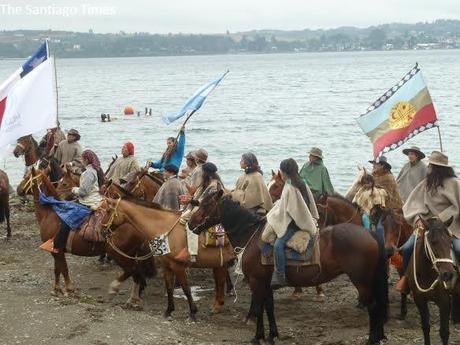
by Steve Anderson / Santiago Times
An international contingent of 40 women and children on horseback rode into Puerto Varas on Thursday to denounce two energy projects slated for the Río Puelo river valley where they live.
The group rode five days from the remote valley to the tourist town of Puerto Varas to condemn the construction of a dam and a run-of-the-river generator designed — they claim — to feed the energy demands of Northern Chile’s mining companies at the cost of their livelihoods.
United as Mujeres sin Fronteras (Women Without Borders), Chilean, Argentine and indigenous Mapuche women began their journey in Segundo Coral, high in the Río Puelo valley next to the Argentine border.
The bi-national Río Puelo river basin begins in Argentina, about 90 miles east of Puerto Montt. One of the projects denounced by the women is owned by transnational Endesa (a subsidiary of Italy-based utility company Enel), and envisions a nearly 330-foot high dam that would inundate 12,350 acres of land including land in Argentina, according to the protesters.
The second energy project denounced by the group is a run-of-the-river generator slated for the Río Manso, a tributary of the Río Puelo, and is owned by Mediterráneo, a nationally owned energy company.
Speaking to a crowd in Puerto Varas, Mujeres sin Fronteras president Maria Isabel Navarrete demanded that the companies respect the rights of indigenous communities and international treaties on shared river basins.
“We are women from this valley who are worried about the destruction of our communities and of the environment, communities that are located in the bi-national Río Puelo river basin,” Maria Isabel Navarrete, president of the group, said in her speech in Puerto Varas. “It is a valley now threatened by terrorists hiding behind the law, who hope to destroy us. But they will not win!”
According to Argentine newspaper Río Negro, the group timed its protest for the end of January as it claims that representatives in the Los Lagos regional government — led by Regional Governor Jaime Brahm — wish to bring a bill on the rejection or approval of the Mediterráneo project to vote in February, just before President-elect Michelle Bachelet takes office and while many government officials are on vacation.
“Mediterráneo and Endesa have conspired with certain political groups and are intent on slyly skirting our laws and international treaties,” Navarrete said. “They are in league with the communications media, who disguise these crimes as ‘progress’ and ‘development.’ And those of us who protest, who opposed this wholesale destruction of our way of life, are called terrorists.”
The protesters alleged that Mediterráneo was already building roads along Río Manso for its run-of-the-river energy project, even though the project has yet to be approved by environmental authorities.
Chile’s 1980 dictatorship-era constitution privatized the nation’s waterways. Ownership of the Río Manso water rights was auctioned off in 2008 for US$44 million to interests representing Mediterráneo.
The protesters also denounced the recent sale of exploration rights for mining proposed for hundreds of properties in the Río Puelo river valley to Mediterráneo.
By Stephen Anderson ([email protected])
Copyright 2014 – The Santiago Times
Steve Anderson - Publisher and journalist Steve Anderson hails from Fayetteville, Arkansas – where he once served as a VISTA volunteer, taught school, practiced law and involved himself in community affairs as a JP on the local Quorum Court and then in national affairs as an aide to Arkansas Congressman Bill Alexamder (1st District). While busy making other plans, force majeure took him to Chile in 1987. In 1991 he launched the Chile Information Project (CHIP) and The Santiago Times as a hobby and spin-off from a project that he began while working at the Catholic Church’s Vicaria of Solidarity. After stringing for various international mining and fruit export publications, he now lives outside of Puerto Montt on his farm in the community of Panitao with his media naranja María Loreto and their son Ray.

